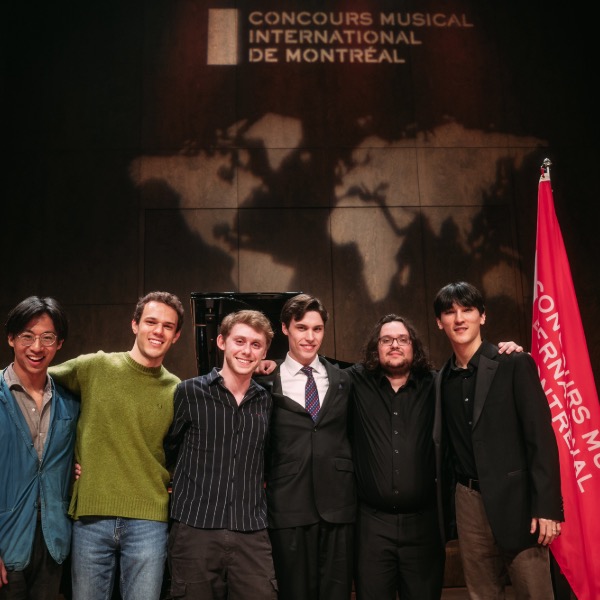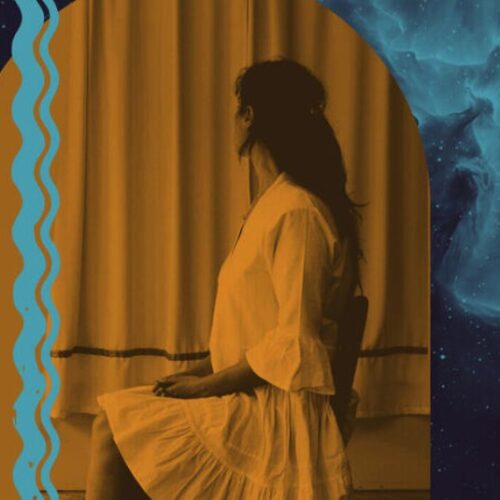Additional Information
We continue our interviews with the last three finalists of the Concours musical international de Montréal (CMIM).
Here’s what American Derek Wang, Canadian Jaeden Izik-Dzurko and Pole Jakub Kuszlik had to say after their dress rehearsal with the Orchestre symphonique de Montréal, under the baton of guest conductor Xian Zhang. The three finalists will perform Tchaikovsky’s Concerto No. 1, Brahms’ Concerto No. 2 and Rachmaninov’s Concerto No. 2, in that order.
PAN M 360: What’s your current state of mind, with just a few hours to go before your final round of the competition?
Derek Wang: This Tchaikovsky is a piece of such grand high emotions. So, it suits the culmination of what’s been a really spectacular event for me in the last two weeks here in Montreal. Of course, as a pianist, I’m just trying to keep it simple and remember that however grand these feelings are, they have to be expressed by pushing down keys that only go down an inch and it’s within that inch or less really that everything has to be expressed. I’m trying to live through and genuinely feel these great heights of emotion and keep it tight, simple and controlled.
Jaeden Izik-Dzurko: There are a lot of specific musical things that I’m thinking about based on what happened at the rehearsal, little tweaks that I want to make, things I have to keep in mind. But in general, I feel very good. It was such a privilege to be playing this beautiful concerto with such incredible collaborators. Maestra Zhang is remarkable and very clear and expressive. Of course, the orchestra sounds fantastic. I’m very excited for tonight
Jakub Kuszlik: Definitely a little bit nervous. I don’t know if there’s anyone who can completely relax before the finals of a big competition, but I’m trying to stay focus, maybe take a rest, and after that, I will probably practice and try to fix some issues that occurred during the rehearsal.
PAN M 360 : Of all the concertos available in the repertoire, why did you choose this one and why?
Derek Wang: You know, I actually didn’t love Tchaikovsky, my whole life. Surprisingly, I sort of discovered other parts of the symphonic repertoire earlier, but it’s been only in the last few years that I think I’ve really gotten bitten hard by this Tchaikovsky bug.
For me, in addition to the extraordinary power of this concerto, there’s an incredible tenderness in the phrasing, an incredible delicacy in the way that he leads you from one idea to the next and I think these moments, the transitional moments in this piece, are the ones that are so fascinating for me. Because, the big climaxes are the parts everyone knows and loves, they actually depend on how you get there and how, once you’ve gotten to a climax or even in some cases, a crisis in the music, you come out of it. That’s what matters. I was really drawn to the idea of personalizing the experience of the piece for me because when I started to study it, I realized that you have to come up with your own answers to many of these questions.
The score is very economical in a beautiful way. I think it is one of the reasons why so many musicians are drawn to it. It’s because whoever you are you have to approach the piece from your own personal experience. You can’t disconnect emotionally from it.
Jaeden Izik-Dzurko: I wanted to perform it for a long time, and I made my initial attempt at learning it, perhaps I was a little bit too young several years ago and set it aside, and then really started picking it back up in the fall of this year. It’s probably one of the monuments of the piano concerto repertoire. It’s just so fast in its scale and ambitious with four movements unlike the traditional three that most concertos have. It also includes such beautiful orchestration. It’s almost like a symphony in many regards. There’s a beautiful cello solo in the third movement, the famous horn solos in the first movement. It really feels like I’m collaborating with the orchestra in a meaningful way, which it’s a wonderful experience with such great musicians.
Jakub Kuszlik: It’s a beautiful piece of music, definitely. When I was a teenager, I just fell in love with that piece. I always dreamed of playing something like this in a big hall with a great symphonic orchestra. I think my dream finally came true.
PAN M 360: What do you want to express through this work?
Derek Wang: For me, the message of the concerto and in particular, the first movement, I just marvel so much at how he delays the final victory until the very last minute. Before that there is so much angst. There’s great moments like I said earlier of tenderness and of hope but they seem to start from a very hopeful place and then end in a very dark place. And it’s only at the very, very last minute that, in the blink of an eye, we change from this struggle to an incredible almost manic happiness. If I can take people through this piece, which is more than the big theme at the beginning and the flashy octaves in the middle, it’s actually an emotional structure, over the course of those eighteen minutes from the first movement, right up to the very last point, I’ll be happy.
Jaeden Izik-Dzurko: It’s mostly a consequence of Brahms’s writing, but I think the work has almost a feel of a vulnerability to it. Brahms’s really wears his heart on his sleeve and he’s not afraid to be intimate in spite of the grandeur of the concerto. The melodic writing is deeply personal. There is something just very sincere, heartfelt and personal about the writing that I hope to be able to transmit in my performance.
Jakub Kuszlik: I definitely want to underline the lyricism that is hidden in that concerto. I’m trying to play it as beautifully as possible. Some people, I think, treat it as a show off piece, maybe a little bit too much. It definitely has big potential to be a show of piece, but for me, it has really beautiful and expressive moments that really touch your soul. So, I really want to try to focus on those places that are more intimate
You can watch the final here
Crédit photo: Tam Photography























